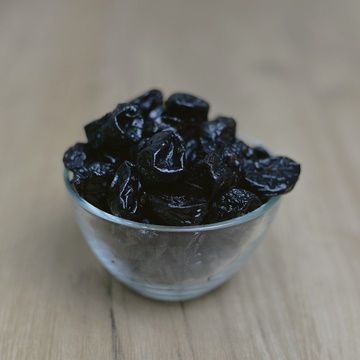The first Nutrition News of 2024 looks at three different yet equally interesting nutritional studies covering topics of bone health through to gum health.
Find out more by reading the full article here.
Prunes for bone health
In the quest to support the body against postmenopausal bone loss, a groundbreaking study delved into the effects of prunes on immune health.
This year-long investigation, part of the Prune Study as reported in the article “Prune consumption may prevent bone loss for postmenopausal women”, analysed how prunes, known to help support the body against bone mineral density loss, might support bone health. The research, involving 235 postmenopausal women aged 55 to 75, split participants into groups: those consuming 50g or 100g of prunes daily and a control group avoiding prunes altogether.
The results showed that prunes didn't significantly influence classic markers, such as high-sensitivity C-reactive protein (hs-CRP) or total antioxidant capacity (TAC), however there were some interesting findings regarding the immune system.
While prune intake didn't directly impact some markers of inflammation or oxidative stress, it did show notable effects on immune response elements. Those consuming 100g of prunes daily experienced reduced levels of activated monocytes coursing through their bloodstream. Additionally, the group consuming 50g of prunes daily demonstrated a noteworthy decrease in TNF-α secretion, a proinflammatory cytokine, from their peripheral blood mononuclear cells (PBMCs).
Furthermore, the 100g prune per day group displayed lowered secretion of several proinflammatory cytokines—IL-1β, IL-6, and IL-8—from PBMCs compared to the control group. These outcomes highlight prune consumption’s unexpected influence on the immune system, pointing toward potential avenues for supporting the body against postmenopausal bone loss.
This groundbreaking research could open new doors in understanding natural interventions for immune modulation among postmenopausal women. While prunes might not hold all the answers, their subtle impact on immune response mechanisms provides an avenue for further exploration in supporting bone health during this stage of life.
Prebiotics shown to improve iron absorption
A study, reported in the article “Prebiotics boost iron absorption for at-risk infants: RCT” has explored the impact of prebiotics, specifically galacto-oligosaccharides/fructo-oligosaccharides (GOS/FOS), when incorporated into iron-fortified infant cereal.
Iron is an essential mineral crucial for various bodily functions, including oxygen transportation, energy production, and the formation of red blood cells.
The research involved 191 infants, randomly assigned to three groups: a cereal with iron and 7.5 g GOS/FOS (7.5 g+iron group), 3 g GOS/FOS (3-g+iron group), or solely iron without prebiotics (iron group). Within a subset of 66 infants from the prebiotic+iron groups, the impact of prebiotics on iron absorption was assessed before and after a 3-week intervention.
Results revealed a significant increase in fractional iron absorption (FIA) from meals containing prebiotics compared to those without before and after the intervention. Post-intervention, FIA surged by 41% and 60% from meals without and with prebiotics, respectively, showcasing the substantial influence of prebiotics in enhancing iron absorption.
Additionally, alterations in gut microbiota were observed: higher levels of beneficial Lactobacillus species and reduced Enterobacteriaceae species and pathogens in the prebiotic+iron groups compared to the iron-only group. Furthermore, markers of gut health, such as faecal pH and calprotectin, were notably lower in the 7.5-g+iron group, signifying a positive impact on gut inflammation.
The study's implications are promising, highlighting that the inclusion of prebiotics in iron-fortified infant cereal not only boosts iron absorption but also mitigates potential adverse effects of iron on the gut microbiome and inflammation. These findings pave the way for potential strategies in managing iron fortification to optimise both absorption and gut health to support children’s health.
Probiotics linked to oral health
In a groundbreaking clinical trial, researchers have investigated the potential benefits of probiotics in oral health. This study, reported in the article “Study: Probiotics aid gum inflammation recovery”, involved a unique approach: refraining from oral hygiene for 14 days, followed by a 14-day period of regular oral care. Throughout this trial, half of the participants received probiotics while the others were given a placebo.
The research aimed to assess various oral health indicators, including supragingival plaque, bleeding-on-probing, oral microbiota composition, and salivary markers. The critical findings emerged at the 28-day mark, where the placebo group demonstrated higher levels of specific bacteria associated with gingivitis. In contrast, the probiotics group showcased increased levels of Rothia species, typically linked to oral health. The study revealed that Streptococcus sanguinis was correlated with the probiotics group, whereas Campylobacter gracilis was associated with the placebo group.
Interestingly, the salivary markers did not exhibit notable changes between the groups, indicating that the impact of probiotics might be more concentrated on the oral microbiota rather than on salivary indicators. Despite limited clinical impact in terms of traditional markers like plaque and bleeding-on-probing, the probiotics demonstrated remarkable microbiological benefits in facilitating the recovery of oral health following gingivitis, pointing to probiotics’ anti-inflammatory properties.
While the findings suggest promising benefits of probiotics in restoring the oral microbiota after gingivitis, the study does have its limitations. Researchers underscored the necessity for larger-scale trials to validate the clinical significance of these findings in a broader population.
This study offers an innovative approach to exploring the potential of probiotics in oral health. Further research and larger trials are essential to confirm and fully comprehend the clinical implications of these findings.
Share your thoughts
Agree with the findings in this week’s Nutrition News? Share your thoughts with us on Facebook and Twitter.
 Alison is Director and Founder of Metabolics who writes about Metabolics updates, events and natural healthcare. Her experience and passion for natural supplements and healthcare comes from her years of experience as a practising osteopath, having founded Metabolics in her search for high quality, natural products in her own work. Alison has been a qualified and practising Osteopath since 1981 and regularly gives seminars on a range of healthcare subjects to the wider practitioner community helping share her knowledge and experience.
Alison is Director and Founder of Metabolics who writes about Metabolics updates, events and natural healthcare. Her experience and passion for natural supplements and healthcare comes from her years of experience as a practising osteopath, having founded Metabolics in her search for high quality, natural products in her own work. Alison has been a qualified and practising Osteopath since 1981 and regularly gives seminars on a range of healthcare subjects to the wider practitioner community helping share her knowledge and experience.



